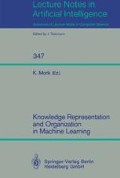Abstract
Knowledge acquisition systems with a model-driven learning mechanism require the representation of that model in the system. The model which guides the learning mechanism must be distinguished from the knowledge (domain model) which is to be learned with the learning mechanism; only the former is the concern of this paper. If the model for guiding the learning mechanism is to be enlarged and improved while working with such a system, the acquisition and representation of new parts of this model must be supported. In addition to the insertion of new parts into the existing model, it is very important to consider redundancy, integrity and completion, because the quality of the model influences the quality of the learning capabilities of the knowledge acquisition system.
In this paper, we present the acquisition facilities for meta-knowledge in the knowledge acquisition system BLIP. The meta-knowledge represents the model used by the learning mechanism in BLIP. It mainly consists of ruleschemes, which describe sets of possible rules in different domains concerning the structure of these rules. The chief task is to acquire new ruleschemes.
This work was partially supported by the German Ministry for Research and Technology (BMFT) under contract ITW8501B1 (project LERNER). Industrial partners are Nixdorf Computer AG and Stollmann GmbH.
Preview
Unable to display preview. Download preview PDF.
References
Balzer, Robert:"Automated Enhancement of Knowledge Representations". In Proceedings IJCAI 1985, Los Angeles, p. 203–207 Distributed by Morgan Kaufmann Publishers, Inc., Los Altos, California
Berwick, Robert C.:"Learning From Positive-Only Examples". In Michalski, Carbonell, Mitchell:"Machine Learning", Volume II, Morgan Kaufmann Publishers, Inc., Los Altos, California, 1986
Buchanan, B.G.; Mitchell, T.M.:"Model-Directed Learning of Production Rules". In Waterman, D.A.; Hayes-Roth, F.(eds.): "Pattern-Directed Inference Systems"; Academic Press, Inc., New York, San Francisco, London 1978
Davis, Randall:"Interactive Transfer of Expertise: Acquisition of New Inference Rules". In Artificial Intelligence 12 (1979), p.121–157, North-Holland Publishing Company
Dietterich, Thomas G.; Michalski, Ryszard S.: "Inductive Learning of Structural Descriptions". In Artificial Intelligence 16(1981), p.257–294, North-Holland
Dietterich, Thomas G.; Michalski, Ryszard S.: "A Comparative Review of Selected Methods for Learning from Examples". In Michalski, Carbonell, Mitchell:"Machine Learning", Togia Publishing Company, Palo Alto, California, 1983
Dietterich, Thomas G.; Michalski, Ryszard S.: "Discovering Patterns in Sequences of Events". In Artificial Intelligence 25 (1985), p.187–232, North-Holland Publishing Company
Dietterich, Thomas G.; Michalski, Ryszard S.: "Learning to Predict Sequences". In Michalski, Carbonell, Mitchell:"Machine Learning", Volume II,Morgan Kaufmann Publishers, Inc., Los Altos, California, 1986
Emde, W.:"An Inference Engine for Multiple Theories", in this volume
Kodratoff, Ives:"Is AI a Sub-Field of Computer Science — or is AI the Science of Explanations". In Bratko; Lavrac: Progress in Machine Learning (EWSL 87, Bled, Yugoslawia), Sigma Press, Wilmslow, England, 1987
Michalski, Ryszard S.:"A Theory and Methodology of Inductive Learning". In Michalski, Carbonell, Mitchell: "Machine Learning", Togia Publishing Company, Palo Alto, California, 1983
Michalski,R.; Ko,H.; Chen,K.:"Qualitative Predication: The SPARC/G Methodology for Inductively Describing and Predicting Discrete Processes". Intelligent Systems Group, Department of Computer Science, University of Illinois at Urbana-Champaign, 1987
Mitchell, Tom M.:"Learning and Problem Solving". In Proceedings IJCAI 1983, Karlsruhe, Germany. Distributed by William Kaufmann, Inc., Los Altos, California, 1983
Mitchell, Tom M.:"LEAP: A Learning Apprentice for VLSI Design". In Proceedings IJCAI 1985, Los Angeles. Distributed by Morgan Kaufmann Publishers, Inc., Los Altos, California
Morik,K.:"Sloppy Modeling", in this volume
O'Rorke, Paul:"Generalization for Explanation-Based Schema Acquisition". In Proceedings AAAI 1984, Austin, Texas. Distributed by William Kaufmann, Inc., Los Altos, California, 1984
Russell, Stuart J.:"Preliminary Steps Toward The Automation Of Induction". In Proceedings AAAI 1986, Philadelphia Distributed by Morgan Kaufmann Publishers, Inc., Los Altos, California
Sowa, J.F.:"Conceptual Structures". The Systems Programming Series, Addison-Wesley Publishing Company, 1984
Wrobel, Stefan: "Higher-Order Concepts In A Tractable Knowledge Representation". In Proceedings GWAI 1987, Geseke, Germany. Informatik Fachberichte, Springer-Verlag Berlin Heidelberg New York Tokyo
Author information
Authors and Affiliations
Editor information
Rights and permissions
Copyright information
© 1989 Springer-Verlag Berlin Heidelberg
About this chapter
Cite this chapter
Thieme, S. (1989). The acquisition of model-knowledge for a model-driven machine learning approach. In: Morik, K. (eds) Knowledge Representation and Organization in Machine Learning. Lecture Notes in Computer Science, vol 347. Springer, Berlin, Heidelberg. https://doi.org/10.1007/BFb0017222
Download citation
DOI: https://doi.org/10.1007/BFb0017222
Published:
Publisher Name: Springer, Berlin, Heidelberg
Print ISBN: 978-3-540-50768-0
Online ISBN: 978-3-540-46081-7
eBook Packages: Springer Book Archive

